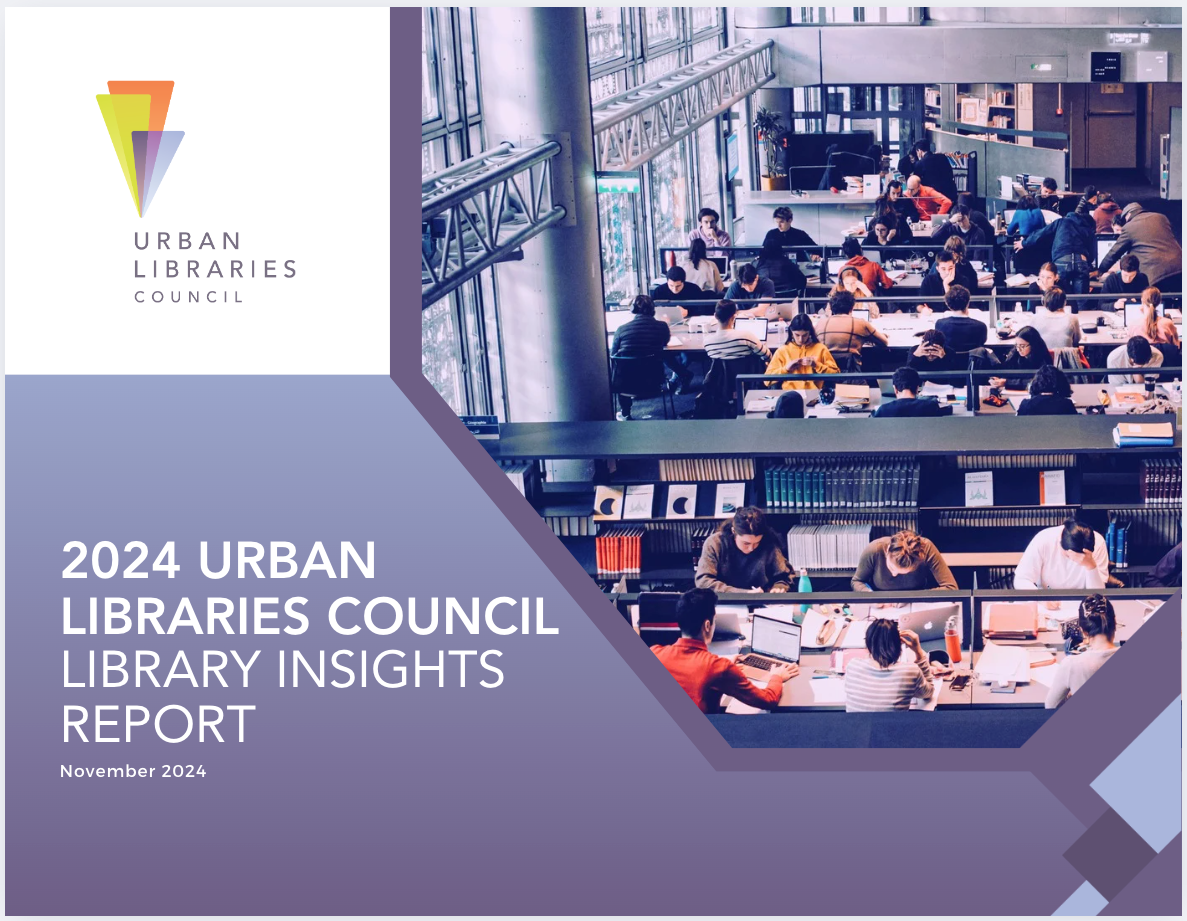Newest Publication | 2024 ULC Library Insights Report
In 2024, ULC's 185 member libraries across the U.S. and Canada participated in the second-annual Library Insights Survey (LIS), collecting 2023 data to build on previous years' insights. The 2024 Library Insights Report, based on responses from 115 libraries serving over 87.5 million people, highlights key trends in patron engagement. As a whole, the results of ULC’s Library Insights Survey are deeply encouraging, showing strong rebounds since the COVID-19 pandemic and offering new insights into soaring e-Resource and meeting space usage.
ULC creates a variety of publications that disseminate cutting-edge knowledge and analysis on topics that are critical to the continued transformation of libraries as community change agents and problem solvers. ULC publications are intended to advance knowledge within and beyond the library community.
ULC Research Products
The Urban Libraries Council is committed to showing the vital nature of public libraries through research, data analysis and data visualizations. The reports below offer a data-informed look into how libraries continually strengthen their operations and serve their communities.
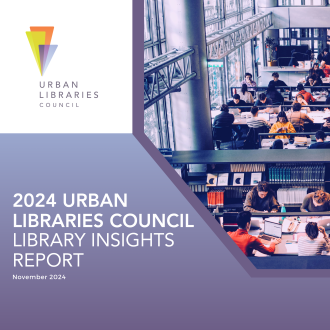
2024 ULC Library Insights Report
In 2024, ULC's 185 member libraries across the U.S. and Canada participated in the second-annual Library Insights Survey (LIS), collecting 2023 data to build on previous years' insights. The 2024 Library Insights Report, based on responses from 115 libraries serving over 87.5 million people, highlights key trends in patron engagement. As a whole, the results of ULC’s Library Insights Survey are deeply encouraging, showing strong rebounds since the COVID-19 pandemic and offering new insights into soaring e-Resource and meeting space usage.
2024
Read Now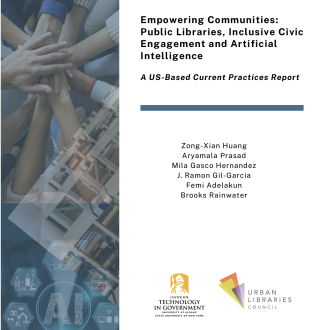
Empowering Communities: Public Libraries, Inclusive Civic Engagement and Artificial Intelligence
As part of ULC’s partnership with the University at Albany’s Center for Technology in Government (CTG UAlbany), we recently published a new report and interactive map that offers an overview of the current AI-related programs and services in public libraries across the United States. Several ULC member libraries are highlighted in this collection of best practices, and their programs demonstrate how libraries have become key hubs for AI learning.
2024
Read the Report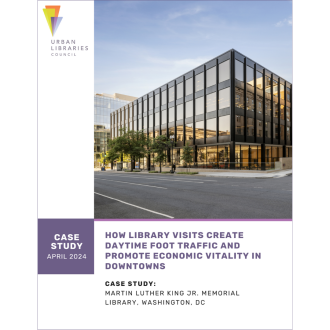
How Library Visits Create Daytime Foot Traffic and Promote Economic Vitality in Downtowns: A Case Study
How are libraries recovering from the COVID-19 pandemic? While libraries with a downtown location historically contribute a significant amount of steady foot traffic and daytime population and serve as trip attractions, has that been happening since the pandemic? ULC is sharing some of our preliminary research around the connection between public libraries and economic vitality in a new case study about what is happening at the DC Public Library, and its impact on Downtown DC foot traffic.
2024
Read NowULC White Papers & Case Studies
To equip public libraries to better demonstrate the role they play in supporting city and county officials’ visions, the Urban Libraries Council has published a series of white papers.
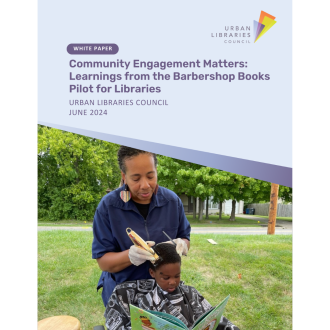
Community Engagement Matters: Learnings from the Barbershop Books Pilot for Libraries
ULC and Barbershop Books supported a small cohort of four library systems as they sought to develop barbershop-based reading spaces and increase reading opportunities for boys of color in their local communities. Each library partner identified and recruited 10 local barbershops, set up and maintained a bookshelf of children’s literature in each shop, and partnered with the barbershops to host community events. This new report from ULC highlights lessons learned from the pilot and each library's best practices for community engagement.
2024
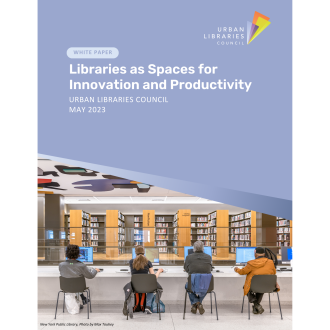
Libraries as Spaces for Innovation and Productivity
Libraries have the unique opportunity to meet the growing demand for flexible workspaces and quality interactions in the third-place. ULC’s newest White Paper, Libraries as Spaces for Innovation and Productivity, explores the importance of libraries as places of congregation in a post-pandemic world and offers recommendations of ways the value of libraries as spaces for innovation and productivity can be emphasized.
Read Now
Food is a Right: Libraries and Food Justice
Public libraries are trusted community institutions that are addressing food insecurity among many local, regional and national issues. This paper frames the current state of food insecurity across North America and the strategic role libraries play in addressing local needs. Included are descriptions of programs, services and activities leading libraries are implementing and recommendations for other library leaders to follow in ensuring their community is nourished.
2023
Read Now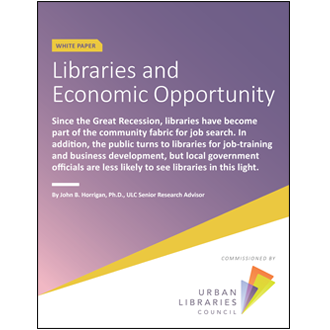
Libraries and Economic Opportunity
This white paper explores how, since the Great Recession, libraries have become part of the community fabric for job search.
2018
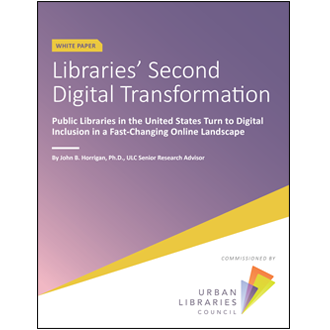
Libraries’ Second Digital Transformation
This white paper explores howl libraries are leading a second digital transformation. The past decade and a half have seen libraries expand their missions in response to the information age, as they have provided computer and internet access for their communities, resources for digital skills and e-books. Today a new era of digital transformation is dawning for libraries as they become places for digital inclusion.
2018
Read Now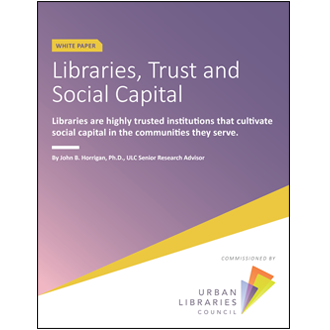
Libraries, Trust and Social Capital
Libraries are highly trusted institutions that cultivate social capital in the communities they serve. This white paper explores how public libraries help cultivate social capital — that is, the resources that help people connect to one another, their communities and find the information that helps them get by.
2018
Read NowULC Leadership Briefs
Our Leadership Briefs are four-page monographs that offer condensed analysis of critical issues driving library performance today.
Effective Strategies and Models for Urban Libraries Addressing Homelessness
ULC's newest Leadership Brief is a compilation of best practices designed to help libraries better serve those experiencing homelessness in their communities. Informed by library leaders across the U.S. and Canada, the report recommends that community partnerships, staff development, and intentional physical design, can better support both unhoused patrons and the library staff who serve them.
2024
ULC thanks EBSCO for their support of this Leadership Brief. Learn more about EBSCO Information Services at www.ebsco.com

The Role of Libraries as Public Spaces in Countering Misinformation, Disinformation, and Social Isolation in the Age of Generative AI
This report from the Urban Libraries Council explores how libraries are tackling misinformation, disinformation, and social isolation in the age of generative AI. Learn how libraries can promote digital literacy and foster social connections to strengthen communities.
2024
Explorations of Generative AI for Library Systems
This new leadership brief from ULC outlines the five ways libraries can integrate cutting-edge artificial intelligence in their work. From leveraging prompt engineering skills of staff members to using AI to advance information literacy, libraries should be preparing for a swift integration of AI across library services, resources and operations. The brief also includes insights from library leaders in Boston, Multnomah County (OR), New York City, Palo Alto, San Francisco and San Jose.
2023
ULC thanks EBSCO for their sponsor support of this Leadership Brief. Learn more about EBSCO Information Services at www.ebsco.com

Libraries as Cornerstones of Democracy
Informed by the work of ULC's Democracy Advocacy Group, this Leadership Brief focuses on the importance of public libraries as leaders in democracy and civic engagement, ensuring all community members have the ability to exercise their fundamental rights.
Please reference "Frequently Asked Questions and Commonly Used Phrases: Talking about Democracy and Free Expression in Public Libraries" as a supplemental resource to the brief.
2023
Anti-Racist Executive Leadership for Public Libraries
Informed by the work and expert guidance of ULC’s Anti-Racism action team, this Leadership Brief focuses on the power of self-aware and committed public library executives in ensuring racial justice, both within our institutions and in our communities. To guide library executives in taking next steps with this lifelong work, the brief provides suggested action strategies and examples of leading practices from ULC library executives.
2021
ULC thanks Gale, a Cengage company, for their sponsor support of this Leadership Brief. Learn more at gale.com/equity.
Digital Equity in the Age of COVID-19
Informed by the work and expert guidance of ULC’s Digital Equity action team, this Leadership Brief spotlights how the pandemic has both intensified the digital divide and created a window for action by raising the visibility of what it means to be unconnected in our hyper-connected world, especially for our most vulnerable residents. This Leadership Brief offers action strategies, key messages and background information to empower library leaders to take on a more active and intentional role in advancing digital equity.
2020
Libraries Leading AI and Digital Citizenship
While AI promises to enhance our communities in remarkable ways, it also poses significant threats to the prosperity, privacy and security of individuals who do not understand or cannot access these new technologies. This Leadership Brief provides targeted strategies for North America's public libraries to ensure an equitable and inclusive future in the Age of AI.
2019
Leadership Roles for Library Trustees
This Leadership Brief highlights the essential roles library trustees play in guiding, shaping and supporting the 21st century library. It focuses on how passionate and committed trustees help establish the library’s place in the community, ensure that the library stays connected to changing community needs and interests and generate support for the library’s long-term future.
2019
Library-School Partnerships to Improve Reading Proficiency
This Leadership Brief examines the power of intentional library-school partnerships to improve reading proficiency among children most in need of assistance. It highlights how libraries are already helping low-income children become more proficient readers and offers action strategies for strengthening library-school partnerships to close the reading opportunity gap.
2019
Strengthening Libraries as Entrepreneurial Hubs
This Leadership Brief focuses on the public library’s role as an essential resource for entrepreneurs and core component of local entrepreneurial ecosystems. It highlights the exciting work already underway in libraries to advance the entrepreneurial spirit and identifies seven strategies for library leaders to become more intentional about implementing programs that support local economic development goals and reach potential entrepreneurs most in need of guidance and encouragement.
2018
Libraries Leading Civic Engagement
This Leadership Brief highlights the essential roles public libraries play in advancing civic engagement in the communities they serve. It identifies five leadership roles to help libraries broaden their impact as go-to resources for building a culture of informed, engaged and empowered residents and provides examples of how libraries are strengthening civic connections.
2017
Partners Achieving Community Outcomes
This Leadership Brief explores how libraries can increase their impact by aligning library programs with city/county leader priorities to drive positive individual and community outcomes. It identifies six action strategies for library leaders to move toward greater community impacts.
2017
Partners for Education
This Leadership Brief highlights the changing education landscape and the progressive work of public libraries to meet the diverse education needs in the communities they serve. It identifies seven action strategies for local elected and appointed officials to pursue with public libraries to improve education outcomes.
2017
Libraries Expanding Summer Opportunities
This Leadership Brief focuses on the progressive work of public libraries in providing summer learning programs that develop students’ skills while maintaining the flexibility of active learning that is unique to the library experience. It builds on the findings of the Accelerate Summer strategic partnership between the Urban Libraries Council (ULC) and the National Summer Learning Association (NSLA) with support from the Institute of Museum and Library Services (IMLS).
2016
Libraries Supporting Family Learning
With widespread recognition that traditional education systems alone cannot meet today’s learning needs, libraries have emerged as powerful 21st-century education leaders. This Leadership Brief builds on the partnership between the Urban Libraries Council (ULC) and the National Center for Families Learning (NCFL) to increase awareness of the role that libraries play in creating opportunities for families to learn together.
2016
Building Connected Communities
Public libraries have established themselves as vital resources in a technology-driven world. This Leadership Brief highlights the role of libraries as community technology leaders who are uniquely qualified to bridge digital divides, support community priorities, and improve quality of life, working in close partnership with community leaders. It provides examples of how libraries are leveraging technology to deliver services that meet community needs and identifies six action strategies to achieve the best possible opportunities for the entire community.
2016
Libraries Igniting Learning
Libraries are embracing a central role in education that is built around new modes of learning which are active, collaborative, interest driven, and participatory. This Brief examines how libraries can leverage their capacities, assets, connections and stature to ignite learning in the communities they serve. It offers six strategies to help libraries become more powerful learning institutions.
2014
Maximizing the Library-Foundation Partnership
This Brief highlights the growing importance of library foundations and identifies critical leadership roles for foundations, executives and boards to maximize the library-foundation relationship.
2013
Library Leaders Owning Leadership
This Brief identifies five leadership themes and five roles for library executives in the rapidly changing and increasingly complex public library environment. It provides food for thought to encourage and support individual action, increased self-awareness, and ultimately success in leading the continued transformation of libraries.
2012
Library Priority: Community-Civic Engagement
How do you move libraries from supporting players to valued leaders in today’s civic engagement space? This Brief identifies five leadership roles to help libraries broaden their impact as the go-to resource for building a culture of enlightened, engaged, and empowered citizens.
2011
ULC Reports
ULC also publishes full-length reports that offer more in-depth knowledge and analysis.
Partners for Middle School STEM: Strategic Playbook
ULC’s Partners for Middle School STEM Strategic Playbook guides library teams in building successful programs and cross-sector partnerships to advance inclusive and robust STEM learning environments for low-income middle school youth.
2021
The Leaders Library Card Challenge: Strategic Guide
The Leaders Library Card Challenge Strategic Guide maps out how ULC and library leaders in over 100 communities have worked together to provide three million children their first library card.This guide provides a roadmap for successful collaboration, drawing on the experiences of participants in the Leaders Library Card Challenge. It recognizes that one size doesn’t fit all communities, instead offering options for moving forward – with a constant eye on fighting the good fight for our children. We hope this guide will expand this important work to many more communities.
2018
Libraries at the Center of Summer Learning and Fun
This online toolkit includes links to tools and materials gathered from libraries across North America that are implementing summer programs designed to engage participants in active skill building, creative exploration, and critical thinking — in addition to reading. This resource was developed in partnership with the National Summer Learning Association (NSLA) as a part of the Accelerate Summer initiative supported by the Institute of Museum and Library Services (IMLS).
2016
Public Libraries and Effective Summer Learning: Opportunities for Assessment
This report discusses the diverse summer learning opportunities provided by public libraries and action steps for initiating assessment of their effectiveness. Working in partnership with the Metropolitan Group and the National Summer Learning Association (NSLA), this publication was developed as a result of ULC's National Forum on Effective Summer Learning in Libraries, an initiative supported by funding from the Institute of Museum and Library Services (IMLS).
2016
Learning Labs in Libraries and Museums: Transformative Spaces for Teens
This report is an excellent encapsulation of the mission of Learning Labs, the important community catalytic affect they have, and the exciting future that is in store for today’s youth. This publications was produced as part of the Learning Labs in Libraries and Museums initiative, a partnership between ULC and the Association of Science-Technology Centers (ASTC) with funding provided by the Institute of Museum and Library Services (IMLS) and the John D. and Catherine T. MacArthur Foundation.
2014
Civic Engagement: Stepping Up to the Civic Engagement Challenge
This report makes the case for public libraries as ideal civic engagement leaders. Based on current research, in-depth interviews and discussion highlights from ULC’s 2011 Partners for Success convening, Stepping Up to the Civic Engagement Challenge is intended for a wide and varied audience of library, local government, business, civic and philanthropic leaders looking for sound ideas and effective strategies to advance the promise of citizens working together.
2012
Partners for the Future: Public Libraries & Local Government Creating Sustainable Futures
This report details how a strategic and successful relationship between the public library and local government can be formed in order to accomplish sustainability for a community. The report focuses on the “triple bottom line” of sustainable development: economic prosperity, environmental quality and social equity, providing numerous examples of high-impact partnerships in specific communities.
2010
Making Cities Stronger: Public Library Contributions to Local Economic Development
This report examines how public libraries contribute to people, technology and the quality of life. Funding for this report was provided by the Bill & Melinda Gates Foundation and Geraldine R. Dodge Foundation.
2007
The Engaged Library: Chicago Stories of Community
This report highlights several Chicago public libraries and their efforts in strengthening the community and effectively enhancing the well-being and capacities of urban neighborhood residents, associations, non-profits and public institutions.
2005

